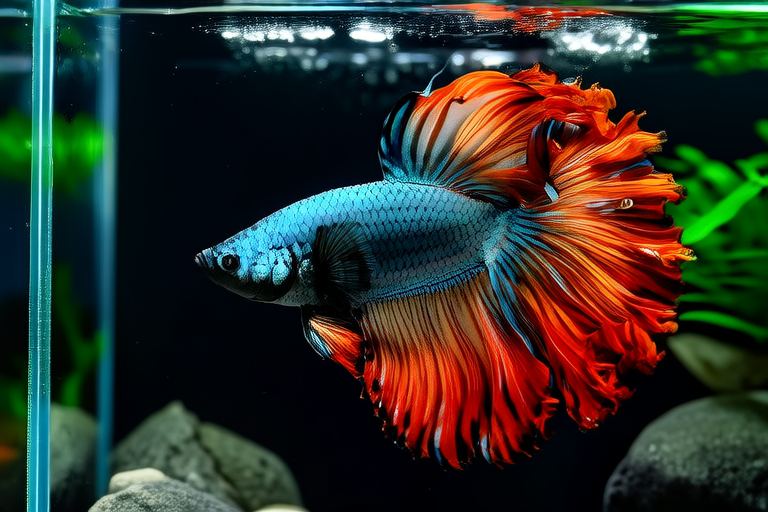Ultimate Guide to Choosing the Perfect Diet for Your Betta
Your betta fish, also known as Siamese fighting fish, is a vibrant addition to any aquarium. Proper nutrition is crucial for their health, longevity, and vibrant coloration. This guide will walk you through the essentials of providing your betta with the perfect diet.
The Importance of Proper Nutrition for Bettas
Just like humans, bettas require a balanced diet to thrive. A well-fed betta will exhibit vibrant colors, robust health, and high energy levels. Poor nutrition can lead to a weakened immune system, making your betta susceptible to diseases such as fin rot or swim bladder disorder. Scientifically, a balanced diet ensures that bettas receive all necessary nutrients, promoting optimal organ function and overall vitality.
Common Dietary Mistakes
Overfeeding is one of the most common mistakes among betta owners. Excess food can lead to water pollution, causing stress and illness. Another frequent error is feeding bettas human food like bread or rice, which lacks the necessary nutrients. Additionally, some owners may rely solely on pellets, ignoring the benefits of varied diets.
Essential Nutrients and Their Sources
Bettas require a mix of proteins, fats, and carbohydrates. Protein is vital for growth and repair, while fats support cell membrane structure and reproduction. Carbohydrates provide energy. High-quality commercial foods, such as pellets and flakes, often contain these nutrients. Live or frozen foods, like brine shrimp or bloodworms, offer additional protein and micronutrients.
Types of Food Available
Pellets
Pellets are convenient and nutritionally balanced. They sink slowly, allowing bettas to eat at their leisure. Choose high-quality brands with visible ingredients like whole fish, vegetables, and vitamins.
Flakes
Flakes float on the water’s surface, making them easy to spot. However, they can quickly deteriorate, losing nutrients. Opt for brands with natural preservatives and a variety of ingredients.
Live/Frozen Foods
Live foods like brine shrimp or daphnia are rich in nutrients but harder to find and maintain. Frozen foods offer similar benefits without the hassle. Both types enhance color and condition, especially during breeding periods.
Frequency and Quantity of Feeding
Feed adult bettas twice daily, offering only what they can consume within two minutes. Overfeeding leads to waste buildup, harming water quality. Younger bettas may need more frequent meals due to rapid growth.
Transitioning Diets
Gradually introduce new foods over several days to avoid digestive upset. Mix small amounts of the new food with the current diet, increasing the proportion each day until the transition is complete.
Maintaining Water Quality After Feeding
Uneaten food can degrade rapidly, polluting the water and stressing your betta. Use a siphon or gravel vacuum to remove debris. Regular water changes help maintain clean conditions.
Signs of a Healthy Diet
A healthy diet results in vibrant colors, clear eyes, and active swimming. Bettas with dull colors or lethargy may benefit from a change in diet. Consult a veterinarian if symptoms persist.
Tips for Choosing the Best Diet Based on Age and Activity Level
Young Bettas
Young bettas grow rapidly, requiring higher protein levels. Pellets designed for growth are ideal. Feed multiple small meals daily to support their development.
Adult Bettas
Adults need a balanced diet to maintain health. Alternate between pellets, flakes, and occasional live/frozen treats. Adjust portions based on activity levels.
Active Bettas
Active bettas expend more energy, requiring more frequent feedings. Ensure their diet includes enough protein to fuel their activity.
Less Active Bettas
Less active bettas may need fewer calories. Monitor their body condition and adjust portion sizes accordingly.
Scientific Insights
Research indicates that bettas fed a varied diet exhibit better health outcomes. Incorporating live or frozen foods provides essential micronutrients not found in standard pellets or flakes. Regular water quality checks are crucial, as poor water quality can negate the benefits of a nutritious diet.
Conclusion
Choosing the right diet for your betta is a rewarding endeavor. By understanding their nutritional needs and providing a balanced diet, you’ll ensure your betta remains vibrant and healthy. Remember, a happy betta is a colorful betta!
